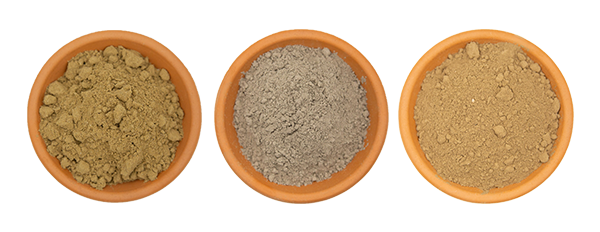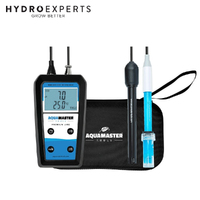Get precise and accurate readings every time with professional pH testers and meters from Hydro Experts. Whether you need a simple pen-type tester for quick checks or a digital meter for more in-depth monitoring, we have a wide range of options to meet your needs.
Leading the way are Bluelab pH pens and combo meters, known for their accuracy and reliability. With an easy-to-read display, they make pH testing a breeze. For more comprehensive monitoring, the Bluelab Guardian monitor continuously tracks temperature, pH, and EC levels.
Replacement pH probes are essential to get consistent readings over time. With proper care and calibration solutions, pH probes can provide years of use, pH 4.0 and pH 7.0 buffer solutions are necessary to calibrate pH meters and ensure readings are on target.
Horiba and Apera Instruments also offer professional-grade pH testers for a variety of applications. Digital pH meters provide precise readings that pen testers cannot match. Soil pH meters are perfect for gardeners and farmers to check growing medium acidity levels.
Fluidd and Flairform make test kits that allow for pH testing without a meter. Simply follow the instructions and compare the color change to the chart provided. Perfect for classrooms and occasional use.
Whether you need a pH pen, meter, monitor, probe, buffers or test kits, Hydro Experts has the solutions to meet your precision pH measuring needs. Contact us today!
Bluelab Guardian Monitor Connect - EC PPM TDS CF PH Temperature | Data Stream
4 Related Content Found

Ten watering rules of thumb

Nominal EC and pH Values for Hydroponic Crops

High TDS / Hard Water Issues

Future Farmers: Will Hydroponic Hops Change the Beer Industry?
What Are pH Meters and Test Kits?
pH meters and test kits are the gardener's best friend, allowing you to unravel the mysteries of your soil and water. These devices determine the pH level, which can be neutral, acidic, or alkaline. Imagine having the power to understand your soil and water at a molecular level!
Why pH Matters
pH is the secret sauce to flourishing gardens. It dictates nutrient availability, affecting your plants' health and growth. Whether you're a seasoned gardener or just starting, knowing your pH levels is a game-changer. It's the key to creating the optimal environment for your green buddies.
Q: Why do I need to calibrate my pH tester?
A: Calibrating your pH tester is essential because the measuring characteristics of pH testers can shift over time. Calibration allows the meter to make corrections for these changes, ensuring accurate readings.
Q: How often should I calibrate my pH sensor?
A: The calibration frequency for pH sensors depends on application conditions. Typically, pH installations calibrate between once a week and once a month. However, it's best to start by calibrating frequently and then adjust based on installation stability and accuracy requirements.
Q: What do I need to perform pH calibration?
A: To perform pH calibration, you'll need:
- Your pH meter
- At least one buffer solution, preferably two within your expected measurement range
- A clean beaker or cup
- Deionized water for rinsing the pH tester's electrode before and after calibration.
Q: How do I store a pH tester?
A: To store a pH tester, keep the electrode's glass bulb hydrated by soaking it in electrode storage solution when not in use. This solution not only hydrates the bulb but also minimizes leakage. If you lack storage solution, a few drops of pH 4 calibration buffer can be used temporarily. Avoid storing the pH electrode in distilled or deionized water.
Q: How do I clean a pH tester?
A: For routine cleaning in water testing applications, rinsing with distilled or deionized water is usually sufficient. If the electrode is heavily soiled, use an electrode cleaning solution. Ensure you regularly maintain your pH electrode to keep it in optimal condition.
Q: Why is it displayed as 7.02 after the electrode is calibrated in a pH 7.00 buffer?
A: The discrepancy occurs because the buffer temperature is around 20 ℃ when you observe 7.02. The pH value of the buffer is defined at 25 ℃ as 7.00. The pH meter automatically compensates for temperature differences to maintain measurement accuracy.
Q: How should pH electrodes be stored?
A: When not in use, store the electrode in 3mol/L potassium chloride solution (3M KCl). Short-term storage in pH 7.00 buffer is acceptable. Avoid long periods of dry storage or soaking in distilled water, as these can shorten the pH electrode's service life.
Q: My pH probe has accidentally dried out, what should I do?
A: To rehydrate a dried-out pH probe, follow these steps:
- Submerge the probe in KCl storage solution for 24 hours (never use RO, distilled, or deionized water).
- Rinse the probe in fresh tap water.
- Soak the probe in fresh pH 4.0 Calibration Solution for at least 10 minutes.
- Calibrate the probe at two points to ensure it hasn't suffered permanent damage.
- Ensure the sponge in the pH Pen storage cap contains KCl Storage Solution or fill the pH Probe cap with enough KCl to cover the sensor for continuous hydration.
Q: How long will my Bluelab pH Pen last?
A: Bluelab's pH pens have an average lifespan of approximately 18 months. Proper care and maintenance can help extend the life of your pen.
Q: There is a salt crust on my probe – why?
A: The salt crust results from the evaporation of KCl (Potassium Chloride) solution present in both the pH pen/probe and the storage cap. This crust is normal and won't harm the probe or meter. Gently wash off the salt under fresh running water. Ensure your probe always contains sufficient KCl in the storage cap to remain hydrated.



















